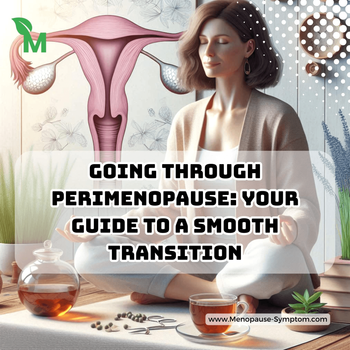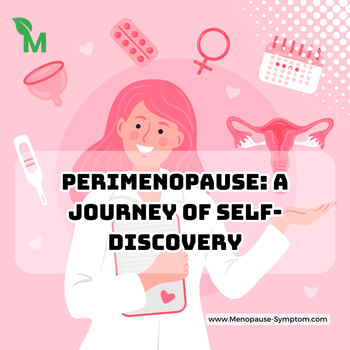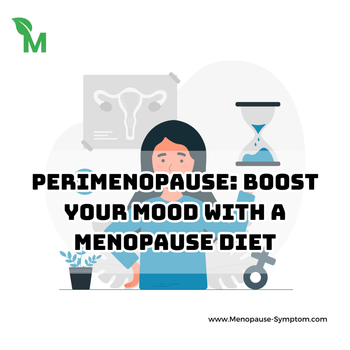In this article, we will learn about the appropriate diet for perimenopause to help you better control your health.
Understanding Perimenopause
Perimenopause is the period when the body begins the natural transition to menopause, marking the end of the reproductive age in women, at this time the body will no longer have an ovulation cycle, menstruation will gradually disappear and there is no longer the ability to reproduce. This period usually occurs at the age of 45-50, and can last 2-5 years depending on the person.
When entering the perimenopause stage, a woman's body begins to show obvious signs of change. Estrogen levels gradually decrease, causing many changes in the female body from the inside. Women often have signs such as irregular menstruation, hot flashes, sweating, insomnia, anger for no reason, headaches, dizziness, thin, dry vagina, easy to get urinary tract infections, declining beauty...
Therefore, understanding perimenopause will help you better prepare for these changes.
The Importance of Meal
A reasonable meal during perimenopause plays an extremely important role. Food not only provides nutrition but also affects perimenopause symptoms. Supplementing foods rich in nutrients can help improve overall health and reduce unpleasant symptoms.
Foods to Eat During Perimenopause
· Foods rich in calcium and vitamin D: To maintain bone health, women during perimenopause need to focus on calcium and vitamin D. Milk, dairy products, salmon, chia seeds and green vegetables are ideal choices. Calcium helps prevent osteoporosis, a common problem during menopause.
· Fiber: Adding fiber from whole grains, fruits, and vegetables helps improve digestion and regulate hormone levels. Fiber also helps maintain a stable weight, thereby supporting the control of perimenopause symptoms.
· Foods rich in phytoestrogens: Foods such as soybeans and flaxseeds contain phytoestrogens, a natural estrogen that can help reduce some perimenopause symptoms. They can help relieve hot flashes and stabilize mood.
· Omega-3s: Omega-3 fatty acids from fish (such as salmon and mackerel), chia seeds, and walnuts have anti-inflammatory properties, help protect the heart, and may help improve mood during perimenopause.
Foods to Avoid
In addition to foods to eat, there are also many foods to avoid during perimenopause. Especially processed foods, which are high in sugar and salt. These foods can increase your risk of weight gain and other health problems.
· Sugary foods: Sugar can increase cravings, cause energy fluctuations, increase hot flashes and mood disorders.
· Caffeinated drinks: Caffeine can increase insomnia and anxiety, common symptoms of perimenopause. Limiting coffee and caffeinated drinks can help improve sleep and health.
· Salty foods: Consuming too much salt can lead to high blood pressure and water retention, worsening overall health.
Active Lifestyle
In addition to taking care of your diet, regular exercise is also essential during perimenopause. Physical activities help increase the body's endurance, reduce stress, improve mood and keep bones strong. If you are just starting out, gentle exercises such as yoga, walking, swimming or participating in group exercise classes are all ideal options.
Stress Management
The perimenopause period can bring a lot of stress and anxiety to women. Therefore, learning how to manage stress effectively is very important. Relaxation methods such as meditation, yoga or simply deep breathing can help you feel more relaxed and comfortable.
In addition, the best way to control stress is to keep your mind clean and comfortable. The biggest influence is the people around you. Regularly having dinner together, sharing with family members or close friends will help your spiritual life to be better nourished. Then, you will have a healthy mind.
Regular Health Checks
Regular health checks are essential to monitor changes in your body. Regular visits to your doctor can help detect health problems early and get timely treatment. Your doctor can give you appropriate advice on diet, exercise and how to manage perimenopause symptoms most effectively.
Finding Support
Finally, don't be afraid to seek support from family, friends and even professionals if you find perimenopause difficult. They can provide you with useful advice and help you feel less alone.
Joining a community of women about perimenopause is very helpful. There, you will meet people who are experiencing the same problems as you or who have gone through them, and you can get many experiences or tips to use for yourself.
Conclusion
Perimenopause is not only a difficult time but also an opportunity for you to review your lifestyle, restore energy and improve your health. With a reasonable diet, combined with regular exercise and effective stress management, you can completely overcome perimenopause more easily. Remember, health is a precious asset and you deserve to enjoy life to the fullest even during menopause.
Start monitoring your diet today to better control your health, not only to cope with the changes but also live a healthy and active life during perimenopause.
Source: Team MPS compiled, analyzed and wrote. Please dont reup without source. Many thanks.

Going Through Perimenopause: Your Guide to a Smooth Transition
Invalid Date
Going through perimenopause can often feel like venturing into uncharted territory, but understanding this transition can help you embrace the changes with confidence.

Perimenopause: A Journey Of Self-Discovery
09.02.2024
Perimenopause is not just a biological stage in a woman's life, but also a meaningful journey that helps us become more aware of ourselves.

Perimenopause: Boost Your Mood With A Menopause Diet
Invalid Date
Perimenopause, the important transitional period before menopause, often brings about emotional and mood swings for women. Diet plays a vital role in helping to improve mood during this period.
